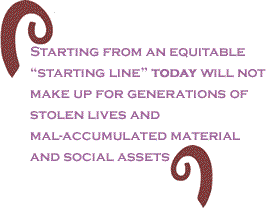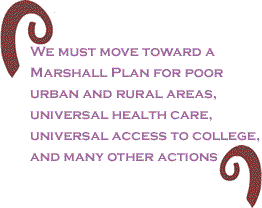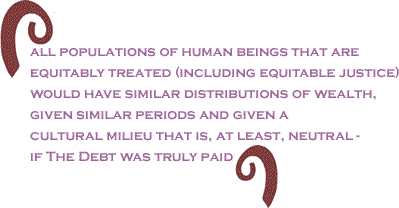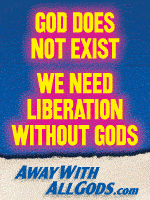At the root of any discussion of racial-relations/slavery/white-supremacy
is the conundrum of The Debt: what (if anything) is owed,
who is owed, how much is owed, how to collect, how to distribute
and whom to distribute to, etc. The majority of people in
the U.S. are stuck on the first
of this set of questions. White minds calculate an answer
that says that the debt has been paid and nothing is owed.
Whites weigh the gift of freedom from slavery versus the number
of Caucasian people that died in the war to end slavery –
more than 600,000 if you count both sides of the Civil War
conflict. This majority is entangled in the urban legend [i] that the Civil War was
about slavery specifically. For whites, the conclusion of
the Civil War adds up to slavery paid for. To their eyes,
discrimination was/is paid for with anti-discrimination laws,
the Voting Rights Act, Affirmative Action, welfare, and the
negative consequences of crime. They say, “Just look at the
success of Oprah Winfrey, Colin Powell, Condoleezza Rice,
Bill Cosby,” and other lucky black folks and superstars. “Look
what some African Americans can do…nothing is owed!” If Obama
wins, he will be added to this list and nothing will change.

Blacks slice those balance books at a longitudinal
angle rather than at a contemporaneous angle. The black view
demonstrates that phrase “the past isn’t past.” Their view
is through the depths of the injury. Blacks count the loss
of the contribution of a great mass of humanity that totals
more than twenty million souls. They count the loss of earned
equity and the over-writing of essential African cultural
building blocks versus the resultant distribution through
the population of economic wealth as compared with those groups
who have lived in this country of the United States as
long as African Americans have. In other words, all populations
of human beings that are equitably treated (including equitable
justice) would have similar distributions of wealth,
given similar periods and given a cultural milieu that is,
at least, neutral - if The Debt was truly paid. We are “all
created equal,” right? Blacks know that differences
in effort, creativity, and bravery are not the reason for
the prosperity differences.
 Some
crimes have no statute of limitations and regardless of the
opportunities and well-being of the victim or the descendants
of the victim, justice still requires accountability. Blacks
see segregated communities that are not “gated” enclaves,
mis-education, and misappropriated governmental resources.
Starting from an equitable “starting line” today will
not make up for generations of stolen lives and mal-accumulated
material and social assets. Blacks see a money-weighted electoral
system that disadvantages them and bends the government to
favor the status quo, a status quo that is weighted with the
encrustation of counting Africans as 3/5 of a person who could
not even cast that 3/5 vote fraction nor have standing in
the courts. Blacks point to persistent poverty unalleviated
by any previous efforts, and, most particularly, an unjust
criminal justice system that herds their youth onto the slippery
slope of criminality at an early age. They see continued discrimination
in hiring, promotion and college entrance; and they see, last
but not least, environmental racism (Katrina).
Some
crimes have no statute of limitations and regardless of the
opportunities and well-being of the victim or the descendants
of the victim, justice still requires accountability. Blacks
see segregated communities that are not “gated” enclaves,
mis-education, and misappropriated governmental resources.
Starting from an equitable “starting line” today will
not make up for generations of stolen lives and mal-accumulated
material and social assets. Blacks see a money-weighted electoral
system that disadvantages them and bends the government to
favor the status quo, a status quo that is weighted with the
encrustation of counting Africans as 3/5 of a person who could
not even cast that 3/5 vote fraction nor have standing in
the courts. Blacks point to persistent poverty unalleviated
by any previous efforts, and, most particularly, an unjust
criminal justice system that herds their youth onto the slippery
slope of criminality at an early age. They see continued discrimination
in hiring, promotion and college entrance; and they see, last
but not least, environmental racism (Katrina).

This is evidence of The Debt that persists
despite any law that is on the books. That adds up to The
Debt that is not just unpaid and not just a check, marked
insufficient funds, but also a continued piling-up of The
Debt and persistent blindness to the consequences. That should
make people angry. Only those without the ability to feel
empathy for a human target of injustice would not understand
that anger. That anger grows when the victims of the crimes
are blamed for their deficits or when their very being, physical
or cultural, is blamed. Feelings of shock and paranoid fear
from displays of African American anger will arise in those
who are blind or in denial about The Debt.
African American
culture is a wondrous, life-saving, reactionary construction
to slavery and discrimination.  African
American culture is forged in the “manifest destiny,” “chosen
people” expression of cultural oppression; that is from where
black cultural intensity arises including the prophetic tradition
of the Black Church. Black culture offers black mental
survival. It is different from the majority European American
culture. African American culture has deep, dark roots with
certain African tribal cultures that squeeze out Gospel, Blues,
Jazz, and what Aimé Césaire called
Negritude, pushed up through the weight of this amalgamation
of European culture that is falsely called “normal” American
culture. Despite the constraints, Blacks excel in all arenas;
truth be told. It is, however, in those cultural spaces where
the cost of entry is low, the rules are relatively clear,
and without bias – such as in some sports fields – that blacks
focus and excel in great numbers.
African
American culture is forged in the “manifest destiny,” “chosen
people” expression of cultural oppression; that is from where
black cultural intensity arises including the prophetic tradition
of the Black Church. Black culture offers black mental
survival. It is different from the majority European American
culture. African American culture has deep, dark roots with
certain African tribal cultures that squeeze out Gospel, Blues,
Jazz, and what Aimé Césaire called
Negritude, pushed up through the weight of this amalgamation
of European culture that is falsely called “normal” American
culture. Despite the constraints, Blacks excel in all arenas;
truth be told. It is, however, in those cultural spaces where
the cost of entry is low, the rules are relatively clear,
and without bias – such as in some sports fields – that blacks
focus and excel in great numbers.
 These
are the precipitating elements of this Debt: an insufficiently
checked historical momentum of racism, the structural rigidity
of U.S.
societal institutions, and the ubiquitous, mostly unrecognized
weight of white supremacist cultural mores (traced to the
foundations of U.S. and European nationality).
This Debt has been visited on most people-of-color. From the
very beginning of contact with the American continent, when
Christopher Columbus encountered the Arawaks on the island of Haiti, The Debt was most egregiously
visited on Native Americans, the “first people” from which
this land was stolen by acts of genocide and many, many treaty
violations. It was rained on Chinese and Japanese immigrants
from the time of the building of the Transcontinental Railroad,
to the ghettoization into Chinatowns, to the World War II internment. The Debt is owed to those
who migrate from our South American neighboring countries,
whose home countries have been devastated by U.S. imperialism. The Debt is also owed to poor
white people who are collaterally damaged by the products
of institutional white supremacy, of which they might be the
most ardent supporters.
These
are the precipitating elements of this Debt: an insufficiently
checked historical momentum of racism, the structural rigidity
of U.S.
societal institutions, and the ubiquitous, mostly unrecognized
weight of white supremacist cultural mores (traced to the
foundations of U.S. and European nationality).
This Debt has been visited on most people-of-color. From the
very beginning of contact with the American continent, when
Christopher Columbus encountered the Arawaks on the island of Haiti, The Debt was most egregiously
visited on Native Americans, the “first people” from which
this land was stolen by acts of genocide and many, many treaty
violations. It was rained on Chinese and Japanese immigrants
from the time of the building of the Transcontinental Railroad,
to the ghettoization into Chinatowns, to the World War II internment. The Debt is owed to those
who migrate from our South American neighboring countries,
whose home countries have been devastated by U.S. imperialism. The Debt is also owed to poor
white people who are collaterally damaged by the products
of institutional white supremacy, of which they might be the
most ardent supporters.

Blacks say that balanced books and forgiveness
are available with reparations (repair) and change. Justice
is more than an apology (which has not been forth coming except
from a tiny number of U.S.
institutions). We are told by Biblical sources that redemption
is only achievable through actual change. Once it is agreed
that The Debt is owed, the other questions of to whom, how,
and from where resources for repair and recompense are gathered,
properly comes to the fore. Jumping to these questions first
is like going to the sentencing trial prior to the completion
of the convicting trial; this tends to retard the whole process
of resolution. The Debt accumulation crime must also be adjudicated
in a restorative justice context rather than in a retributive
justice context. This is not about vengeance. This is about
repairing and building community. If we are to be one nation,
one family, then the actions we take, based upon agreement
on The Debt, must be to repair all our weakened and broken
parts.

Clearly, this would entail rooting out the
institutional biases that militate against non-European (white)
cultural adepts, the poor, those who have criminal records,
and/or have limited education. With ALL the land and
resources that have been stolen, there should
be no homeless person in the U.S.;
resolving that tragedy would take only a tiny, tiny fraction
of a percent of the owed Debt that is in the U.S.
treasury. Let’s start there! In some sense, we must move toward
a Marshall Plan for poor urban and rural areas, universal
health care, universal access to college, and many other actions.
However, the discussion of actions to take to accomplish change
and repair - a discussion in which everyone should take part
- will not and should not happen until there is agreement
that The Debt is owed. Any talk about gains through merit
rings hollow when folks luxuriate in gains earned through
genocide, theft, slavery, and discrimination.


































 Some
crimes have no statute of limitations and regardless of the
opportunities and well-being of the victim or the descendants
of the victim, justice still requires accountability. Blacks
see segregated communities that are not “gated” enclaves,
mis-education, and misappropriated governmental resources.
Starting from an equitable “starting line” today will
not make up for generations of stolen lives and mal-accumulated
material and social assets. Blacks see a money-weighted electoral
system that disadvantages them and bends the government to
favor the status quo, a status quo that is weighted with the
encrustation of counting Africans as 3/5 of a person who could
not even cast that 3/5 vote fraction nor have standing in
the courts. Blacks point to persistent poverty unalleviated
by any previous efforts, and, most particularly, an unjust
criminal justice system that herds their youth onto the slippery
slope of criminality at an early age. They see continued discrimination
in hiring, promotion and college entrance; and they see, last
but not least, environmental racism (Katrina).
Some
crimes have no statute of limitations and regardless of the
opportunities and well-being of the victim or the descendants
of the victim, justice still requires accountability. Blacks
see segregated communities that are not “gated” enclaves,
mis-education, and misappropriated governmental resources.
Starting from an equitable “starting line” today will
not make up for generations of stolen lives and mal-accumulated
material and social assets. Blacks see a money-weighted electoral
system that disadvantages them and bends the government to
favor the status quo, a status quo that is weighted with the
encrustation of counting Africans as 3/5 of a person who could
not even cast that 3/5 vote fraction nor have standing in
the courts. Blacks point to persistent poverty unalleviated
by any previous efforts, and, most particularly, an unjust
criminal justice system that herds their youth onto the slippery
slope of criminality at an early age. They see continued discrimination
in hiring, promotion and college entrance; and they see, last
but not least, environmental racism (Katrina).
 These
are the precipitating elements of this Debt: an insufficiently
checked historical momentum of racism, the structural rigidity
of
These
are the precipitating elements of this Debt: an insufficiently
checked historical momentum of racism, the structural rigidity
of 









